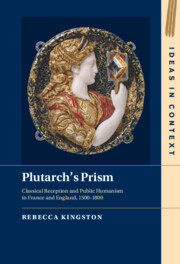Book contents
- Plutarch’s Prism
- Ideas in Context
- Plutarch’s Prism
- Copyright page
- Contents
- Figures
- Preface
- Acknowledgements
- Introduction
- Part I Setting the Stage
- Chapter 1 A Brief Introduction to Plutarch and a Comparison of Cicero and Plutarch on Public Ethics
- Chapter 2 The Secret History of Plutarch (and the History of Pseudo-Plutarch) and a Brief Account of Reception in Renaissance Italy
- Part II Plutarch in Renaissance France and England
- Part III Seventeenth- and Eighteenth-Century Plutarch
- Bibliography
- Index
Chapter 2 - The Secret History of Plutarch (and the History of Pseudo-Plutarch) and a Brief Account of Reception in Renaissance Italy
from Part I - Setting the Stage
Published online by Cambridge University Press: 22 September 2022
- Plutarch’s Prism
- Ideas in Context
- Plutarch’s Prism
- Copyright page
- Contents
- Figures
- Preface
- Acknowledgements
- Introduction
- Part I Setting the Stage
- Chapter 1 A Brief Introduction to Plutarch and a Comparison of Cicero and Plutarch on Public Ethics
- Chapter 2 The Secret History of Plutarch (and the History of Pseudo-Plutarch) and a Brief Account of Reception in Renaissance Italy
- Part II Plutarch in Renaissance France and England
- Part III Seventeenth- and Eighteenth-Century Plutarch
- Bibliography
- Index
Summary
Chapter 2 is a prelude to the main account of reception but offers some analysis of the first great reference to Plutarch in the post-classical world in John of Salisbury’s Policraticus (c. 1159). Despite the apocryphal nature of John’s Plutarch, the association of Plutarch as tutor to the Emperor Trajan was a trope which provided greater weight to the authority of his writing in the subsequent history of political thought. In the latter part of this chapter, I give a brief synopsis of a few essays (“On Homer” and “On the Education of Children”) which are now deemed apocryphal but which for many early modern scholars formed a legitimate part of Plutarch’s corpus. I discuss how we should consider these texts in the context of a history of Plutarch reception. I also discuss briefly the development of scholarship on Plutarch in early Renaissance Italy.
Keywords
Information
- Type
- Chapter
- Information
- Plutarch's PrismClassical Reception and Public Humanism in France and England, 1500–1800, pp. 65 - 92Publisher: Cambridge University PressPrint publication year: 2022
